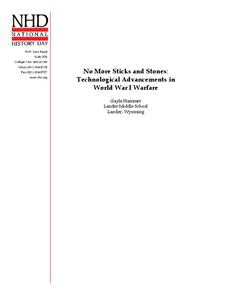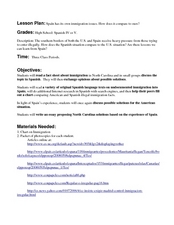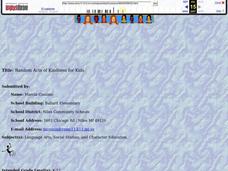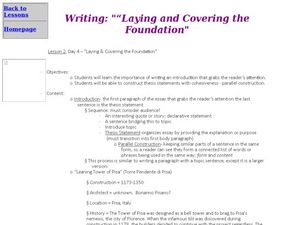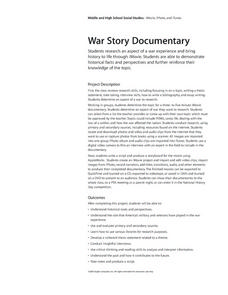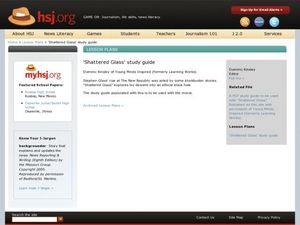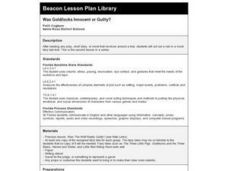Curated OER
Trek Across America
Bring a time machine into your classroom with this writing lesson, in which young writers project themselves back in time and have a variety of choices from that point forward. They either write a conversation with a historical figure,...
National History Day
No More Sticks and Stones: Technological Advancements in World War I Warfare
Remind young historians that many technological advancements influenced the events of World War I. After analyzing technology's evolution through primary sources, discussing the changes over time, and watching various video clips,...
Curated OER
Organizing by Writing
Middle schoolers analyze how to use writing for generating and organizing their thoughts before communicating them. They use the questions on the first handout to organize a three-minute introduction of themselves to their small group....
EngageNY
Analyzing Point of View: Inferring about the Natural Disaster in Eight Days
Who is telling the story? Readers take a look at the text Eight Days to determine if the story is told in first or third person. They then discuss in groups and complete a shared writing activity to describe how the narrator's point of...
Curated OER
Immigration in Spain
How many people immigrate to Spain illegally each year? Both the United States and Spain see a lot of illegal immigration. Advanced learners will read various articles, compare and contrast the situation in both countries, and discuss...
Curated OER
US Constitution And Federal/State Relationship
Students examine the Constitution for references to the relationship between state and federal governments. They examine Supreme Court cases for examples of the division of government between state and federal powers.
Curated OER
Random Acts of Kindness for Kids
Students examine the concept of kindness to others. They define kindness, listen to various stories about random acts of kindness, and create an e-mail chain describing their own acts of kindness that is sent around the world.
Curated OER
Writing: Laying and Covering the Foundation
Your middle schoolers can become stronger writers with a lesson covering the basics. They compose effective thesis statements and introductions, discuss different ways to capture a reader's attention, and compare a poorly written...
Curated OER
Analyzing Literature via Literature Circles
Introduce literature circles with Roland Smith's novels. Your seventh graders will see the activity modeled as you read The Three Little Pigs together and apply the format to a Roland Smith novel of their choice. The lesson includes...
Curated OER
Problem Solution Writing
Students, after brainstorming possible problem solving activities, choose from one of the many and write what the problem is and a solution to solve it.
Curated OER
War Story Documentary
Students review research skills and determine an aspect of war to research. They research an aspect of a war experience and bring history to life through iMovie.
Curated OER
Shattered Glass Study Guide
Students view a movie about ethical journalism and Stephen Glass' rise at The New Republic. In this news ethics lesson, students view "Shattered Glass" and explore Glass' descent into an ethical black hole. Students complete...
Curated OER
Argumentation and Logic
Students recognize inductive and deductive reasoning and analyze common fallacies in critical thinking. In this argumentation and logic lesson plan, students use role playing activities and specific instances of inductive and...
Curated OER
Was Goldilocks Innocent or Guilty?
Fourth graders act out a mock fairy tale trial. They use a fairy tale like "The Three Little Pigs", "Goldilocks and the Three Bears", "Hansel and Grete"l, and/or "Little Red Riding Hood".
Curated OER
Japanese Religion (Shinto)
Fifth graders explore the relationship between the early Japanese religion of Shinto and the natural phenomena of Japan. They engage in Day 3 of the Warlords of Japan simulation.
Curated OER
The Teller of the Tale, Part 3
Students practice use of volume, stress, pacing, enunciation, eye contact, and gestures needed to meet the needs of the audience when presenting their own tales based on Chaucer. They receive teacher and student feedback and prepare to...
Curated OER
Expansion and Reform: Applying the Declaration of Independence
Students conduct inquiries and research-acquiring, organizing, analyzing, interpreting, evaluating, and communicating facts, themes, and general principles operating in American history. They use the Declaration of Independence to...
Curated OER
Unit Plan for Mark Twain and American Humor
Students create brochures about the humor of Mark Twain. In this literature-analysis lesson plan, students read "The Celebrated Jumping Frog of Calaveras County" and other short stories by Twain. Students write analytical paragraphs and...
Curated OER
Scientific Inquiry
Sixth graders research the theories on the extinction of the dinosaurs. In this dinosaur extinction lesson, 6th graders view a video clip about scientific inquiry. They work in groups to research the two theories on dinosaur extinction.
Curated OER
All About Me
Students examine their own personality traits and preferences. They use this information to write an autobiography.
Curated OER
Female Poets Speak For Themselves
Student examine selected works of twentieth-century female poets that speak to the stereotypes about women inherent in Western culture. Individually, students explore these stereotypes and their experience with them. Students create a...
Curated OER
Eco-Graphics - Photographic Studies of Man's Impact on the Environment
Students, in groups, explored and photographed their own community disposal problems, focusing on the impact of waste disposal behaviors, laws, systems, and management.
Curated OER
Approaching Walden
Eleventh graders examine their natural surroundings as a way to begin thinking about an abstract idea. They analyze and compare or contrast the rhetorical stategies of two essayists. Students interpret and evaluate images culled from...
Curated OER
Transformations
Students identify the types of transformations in their lives. As a class, they determine the ones they have control over and which ones they do not. They practice solving problems in math and oral communication that they are faced with...

